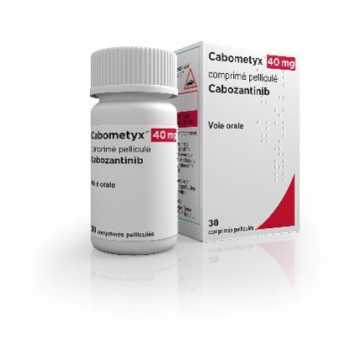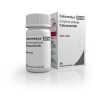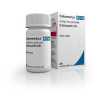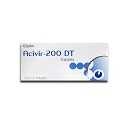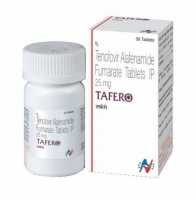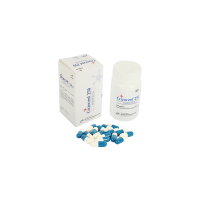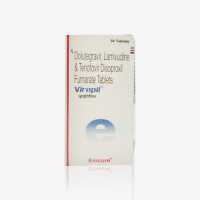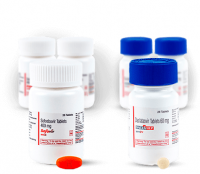Cabometyx 40mg (Cabozantinib)
Courier service EMS
Other transport services
Air India Post International
Payment in the bank on the invoice
WestrUnion
MoneyGram
Cabometyx 40mg
Description
Cabometyx 40mg belongs to a small molecule inhibitor of several tyrosine kinases which are thought to be including in tumour growth and angiogenesis. It is used for patients with renal cell carcinoma which has progressed after being treated with a vascular endothelial growth factor receptor inhibitor such as sorafenib, pazopanib or axitinib.
Cabometyx 40mg is a prescription drug which is used under the supervision of doctors.
Indication
Cabometyx 40mg is used for the treatment of conditions as follows
Metastatic medullary thyroid cancer and;
Advanced renal cell carcinoma (RCC) who have getting before anti-angiogenic therapy.
Hepatocellular cancer who have previously received sorafenib.
Mechanism of action
Artificially biochemical and/or cellular assays have shown that Cabozantinib prohibits the tyrosine kinase activity of MET, VEGFR-1, -2 and -3, AXL, RET, ROS1, TYRO3, MER, KIT, TRKB, FLT-3, and TIE-2. The following receptor tyrosine kinases are including in both normal cellular function and pathologic processes such as oncogenesis, metastasis, tumor angiogenesis, drug resistance, and maintenance of the tumor microenvironment.
ADME Properties
Peak plasma concentration is observed in 2-5 hours
Human plasma protein bounding of Cabometyx is ≥ 99.7%
Mostly metabolized by CYP3A4 and minorly by CYP2C9.
Eliminated mostly via feces 54 % and in urine 27% and half-life is 55 hours.
Dosage and administration
Avoid substitute Cabometyx tablets with Cabozantinib capsules.
The prescribed dose of Cabometyx is 60 mg.
Administration Cabometyx is without food.
Advise the patients not to eat for at least 2 hours before and 1 hour after taking cabometyx. Follow the treatment until patient no longer experiences clinical benefit or experiences unacceptable toxicity.
Swallow Cabometyx tablets whole. Do not crush Cabometyx tablets.
Side effects
- GI perforations and fistulas
- Thrombotic events
- Hypertension and hypertensive crisis
- Diarrhea
- Palmar-plantar erythrodysesthesia
- Haemorrhage
- Reversible posterior leukoencephalopathy syndrome
Drug interaction
While concurrent use with strong CYP3A4 inhibitor will increase the single dose plasma Cabometyx 40mg exposure by 38%.
While Co administration with strong CYP3A4 inducers will decreased the single dose plasma Cabometyx 40mg exposure by 77%
Concomitant use with MRP2 inhibitors may increase the exposure to Cabometyx 40mg.
Contraindication
Cabometyx 40mg is contraindicated patients having hypersensitivity reaction to the active substance or its excipients.
Precautions
Monitor the patients for symptoms of perforations and fistulas, contain abscess. stop Cabometyx 40mgin patients who experience a perforation or a fistula.
Do not administer Cabometyx 40mgto patients with a present history of haemorrhage or haemoptysis.
Discontinue the Cabometyx 40mgin patients who develop an acute myocardial infarction, cerebral infarction, or any other clinically significant arterial thromboembolic complication.
Discontinue the Cabometyx 40mgfor patient if have severe hypertension that cannot be controlled with anti-hypertensive therapy.
Discuss pregnant women about possible risk to a foetus. Advise females of reproductive possible to use effective contraception during treatment with Cabometyx 40mgand for 4 months after the last dose.
Pregnancy
Based on studies of animal and mechanism of action, Cabometyx 40mg will cause fetal harm when given to pregnant women. Advice the female not to become pregnant while on treatment with Cabometyx 40mg.
Lactation
During treatment with Cabometyx 40mg, advise the women not to breastfed to infants
Storage
Store the drug at 200C to 250 C
Keep away from the children resistances
Missed dose
If the patient missed to take a dose, then should not to take an extra dose, but to take the next dose at the regular time, skip the missed dose. Do not take the missed dose within 12 hours of next dose.
- Trade name Cabometyx 40mg
- Substance Cabozantinib
- Manufacturer Exelixis Inc
- Packaging 30 tablets
- Country of origin India
-
Convenient deliveryWe deliver to all countries of the World *. We cooperate only with trusted cargo carriers.
-
CONTROL AND INSPECTIONItem is checked before shipping! All the medicines are delivered directly from the manufacturer and sent from India to the client's address.
-
CHOOSE USWe provide the best price, including insurance against loss through the fault of the carrier. Our company cooperates directly with the largest manufacturers of medicines in India.
-
Promotions and DiscountsWe offer a flexible system of discounts for our customers and fixed discounts for current offers. Regular customers receive a discount of up to 10% of the amount of orders, as well as a remuneration system for referring customers via a referral link.

